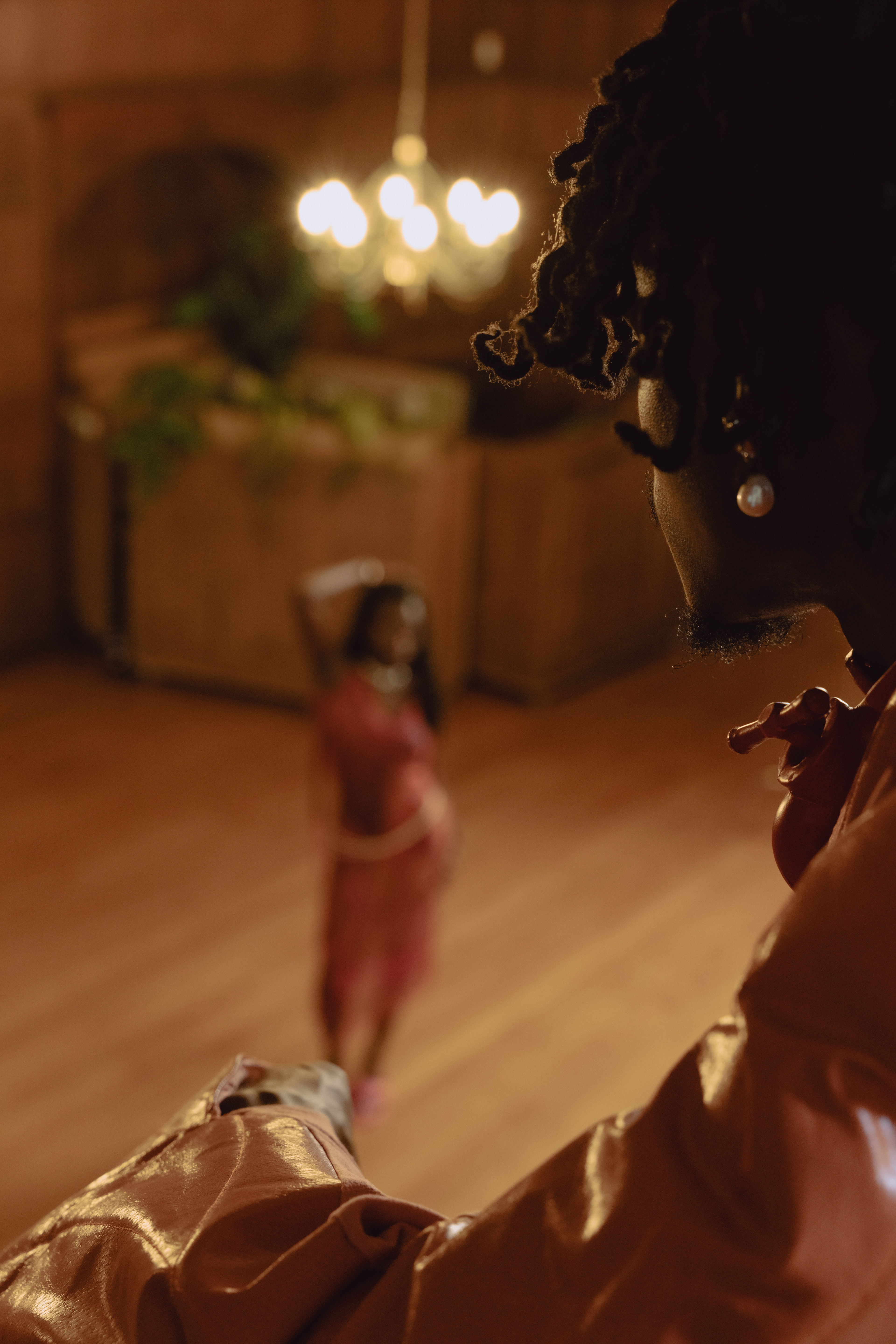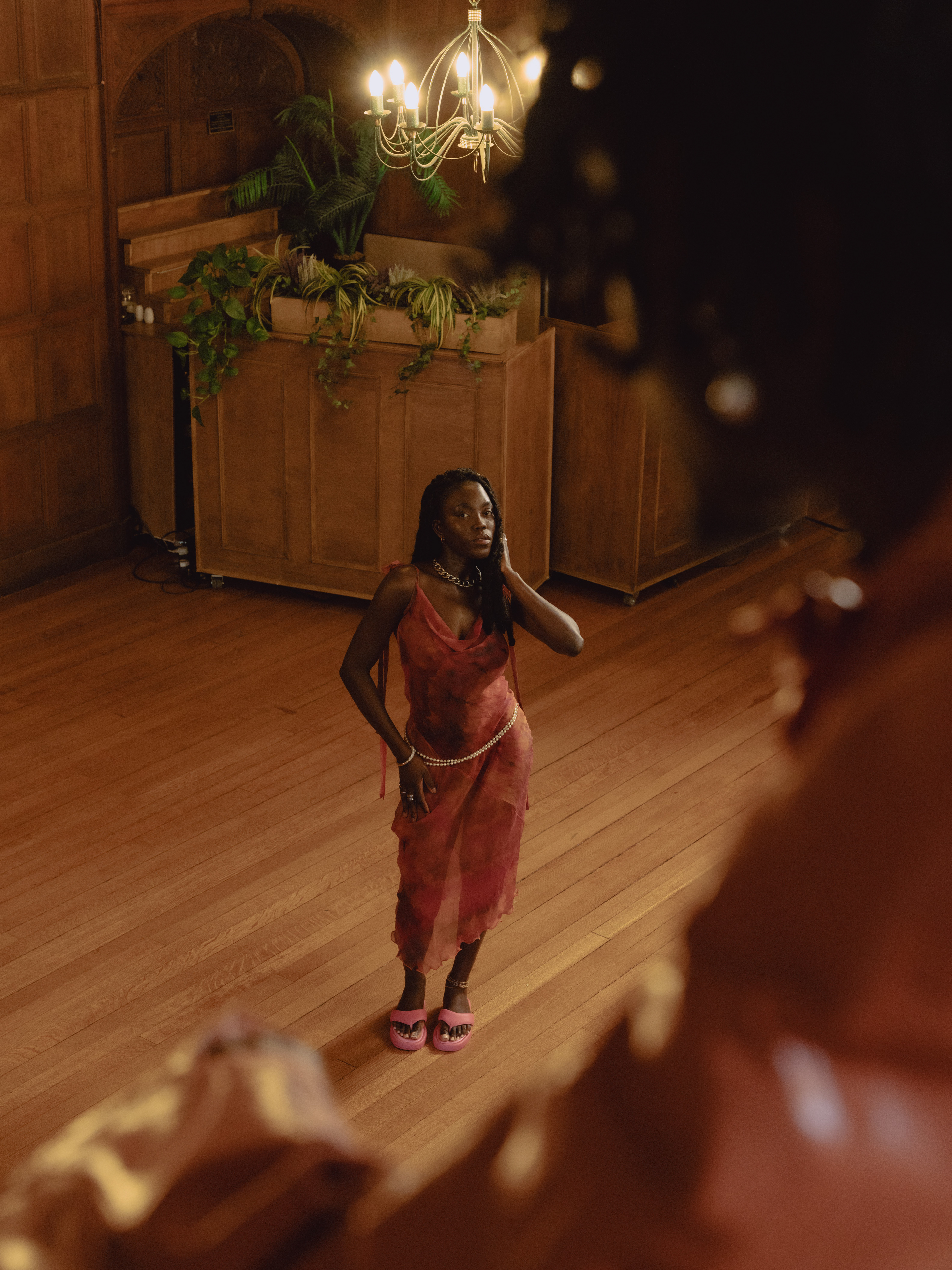A self-professed emotional gangstar, Gabriel Ojo-Osagie, otherwise known as GJTheCaesar, is the rapper making realness cool again. With sounds inspired by his Nigerian heritage and love of both American and British Hip-Hop, Rap and RnB, GJ’s latest project encapsulates vulnerability and soul; something, he says, is a reflection of his relationship with music.
In conversation with BAD Concept, GJ explains that he creates from a place of genuine love for the art, and as a therapeutic process–read more below.
SO: Where did the name GJTheCaesar come from?
GJ: It happened very spontaneously, it was very unplanned. I was writing lyrics, and it sounds corny, but I was 14, I was writing and I wrote: “The king of rap, call me GJ the Caesar”. And everyone just started calling me GJ the Caesar. Then when it was time to come up with an actual professional name, I was like, why not? I'll just leave it as this.
SO: How important was music for you growing up? Was it always something that you wanted to pursue?
GJ: 100%, it's something I've always loved. The intent to pursue came when I was about 20, and I started taking it more seriously. I started going to the studio more and just felt like this was something that I could actually make a career out of.
SO: What made the change for you to turn it from a hobby to a serious career path?
GJ: It was when people around me told me to take it seriously. They kept saying, you’re really good at this. And I really enjoyed it, making music and being around music; and just wanted to get better at it. I've been exposed to music my whole life, so it was inevitable.
GJ wears a suit, shirt and tie by Selina Kwong, shoes by Fidel Storp and Dola Jewellery
SO: And since deciding to take music seriously, what has the journey looked like in terms of defining your musical identity?
GJ: It’s definitely been a journey, because when you first start making music, you have to find your voice, you're going to mimic a lot of what's already out there, because you're just trying to do what you think is cool. Eventually you make enough songs or you practise enough, and then you begin to come to terms with who you really are as a person. The most important thing is I'll have to feel like I am actually expressing myself because it’s like therapy for me. I love making music, you have to find what you enjoy and that's what gives me my identity.
SO: Who would you say are some of your inspirations when you were younger? People that you loved listening to but also people that inspired you as an artist?
GJ: Michael Jackson, I’m a huge fan. I would say I know all his songs. I used to listen to a lot of hip hop when I was young as well. I had an iPod when I was like 10 and it had old music on it, like 50 Cent, Nas, Jay-Z. I used to listen to a lot of Brandy or old school music like Luther Vandross.
My family has very good music taste, they definitely influenced what I listened to growing up. But I’ve also developed my own personal taste.
My inspiration as a rapper would have to be Lil’ Wayne, he was probably the biggest artist ever when I was a teenager. And just before him was 50 Cent. They inspired me to want to be a rapper and to experiment with my music. And then I remember when I first listened to artists like The Weeknd, Frank Ocean. It just sounded so different. So refreshing. I’ve been a fan since 2011, they just opened my mind completely. And then when I heard Kendrick it changed, it was so experimental and they played around a lot with production mixing different genres and sounds that I enjoy like jazz, hip hop, r&b and then a Latin urban twist to it.
SO: If you could describe your music in one word or one sentence, how would you describe it?
GJ: It's unique, it’s jiggy.
Gj wears pants and shoes by Fidel Storp and jewellery by Kartur Builds
SO: How does it feel when you listen to it?
GJ: Feels relatable. The lyrics especially. And the production, I like it to be familiar enough for people, but still have certain twists that make us stand up.
SO: You’ve spoken in the past about being an introvert, what does that look like for you when performing?
GJ: Okay, so the thing is, I know how to compartmentalise really well. I know when it's time to socialise, I know when it's time to have my alone time, I know when it's time to make music, I know when it's time to perform. And I can separate these things. So when it's time to perform, I do it and I always remember why I am even performing in the first place.
In terms of being introverted. I'd rather just chill with my friends, do something calm, play some music in the background. I like to study, I like to research things, but I love to meet people.
SO: What was the process of curating this album, sonically, lyrically?
GJ: Sonically, I wanted it to sound very refreshing. I wanted people to press play, to listen and be like, haven't heard anything like this. Who's this person? I wanted it to feel personal.
And I wanted it to have a bit of soul in it, something you can enjoy chilling or driving.
SO: You titled this Emotional Gangstar–how accurate of representation is that of you as a person?
GJ: To be honest, a lot of people are–it just shows the duality of human beings. Life isn't linear. We might be like this. And we're certain we might be like that in a different setting. And it just encompasses everything you can be as a person. Part of it is being emotionally intelligent, being in touch with how you feel, your thoughts, and the society around you. And then there’s the side where you just have to be tough. Yeah, you know, you just have to actually go out and get it. But both are an overflow of who I am as a person.


SO: Would you say that is also reflected in the way you dress and the way you style yourself?
GJ: I feel like my uncle is a huge fashion inspiration for me, he has a clothing line, and he's just always been fly–especially the clothes he designs.
My own personal taste is a bit different. I like the rock style, wearing a lot of leather. But at the same time, I want to be comfortable, I don't necessarily want to be the centre of attention. But I like to wear whatever makes me feel good and for my style to be an extension of how I feel.
SO: Besides your uncle, who else inspires you fashion wise?
GJ: Definitely ASAP Rocky & Kanye back in the day. I like to really mix it up and do a bit of everything, but still keep it smooth.
SO: So on this project, you've got a few collaborations, how important is collaboration for you as an artist?
GJ: I love it so much. Honestly, I love working with people. Me, Ayuu, and Andre Wolff, we have a little collective because we spend all this time together making music, and we're actually like brothers, like all of us. I never want to force a connection or try to make things happen just because you think they should. It's so much easier when you just vibe with another artist. Like, the songs we make literally take us 15 minutes and then we just keep making more.
Leo wears dress by sssilk666, GJ wears agbada and pants sourced and designed by Maga Halilu, both wear Dola Jewellery
SO: There are a few tracks in the project where we hear you rap in Pidgin or Yoruba–how important is it for your culture to be expressed in the project?
GJ: I'm a very, very proud Nigerian, I went to high school in Nigeria for six years, I’ve studied Nigerian history, so speaking in Yoruba is like second nature to me.
I always told myself at some point that I want to start incorporating my background into the music because a lot of the time people who listen to my music are Nigerians as well. So I want them to relate to what I’m singing about. I've listened to a lot of Nigerian music since growing up. And there’s even a lot of artists from Abuja, who I’ve been making music with for a long time, and Abuja is a melting pot, you have all types of people there with different backgrounds, different religions, different music tastes, different cultural essences. And it just grows into something different and unique. So that shapes my mind and my sound as well.
SO: What's next after this project drops?
GJ: We're trying to go on tour. I'm also gonna start going into merch. I'm gonna have shades and stuff like that. I really want to get more into fashion, I design and did a masters in project management so I want to bring everything together.
Project Coordinators Terna Jogo, D.wiafe and Adrian Wood (Content Lab)
Artist GJTheCaesar
Photography Genesis Tennision
Video Brian Bett
Producer Kenechi Amamgbo
Female Lead Leonette Dias
Saxophonist Ben Oke
Stylist Maga Halilu
Movement Direction Zahra Bailey
Floral Designer Elle Shoel
Interview by Sayo Olukoga
Gaffer Kushagra Aanand
BTS Photography Ana Blumenkron, D.wiafe and Adrian Wood
BTS Video Kushagra Aanand
Graphic Design William Sousa
Special Thanks Jack Hartshorn and Martin at Kingswood Arts, the Kitroom and Max Hougton at LCC
and Hakeem Osman, Gabija Morkunaite and Maria Marion at Capture One
Supported by LCC EDI, PARC, T&L
Photography Genesis Tennision
Video Brian Bett
Producer Kenechi Amamgbo
Female Lead Leonette Dias
Saxophonist Ben Oke
Stylist Maga Halilu
Movement Direction Zahra Bailey
Floral Designer Elle Shoel
Interview by Sayo Olukoga
Gaffer Kushagra Aanand
BTS Photography Ana Blumenkron, D.wiafe and Adrian Wood
BTS Video Kushagra Aanand
Graphic Design William Sousa
Special Thanks Jack Hartshorn and Martin at Kingswood Arts, the Kitroom and Max Hougton at LCC
and Hakeem Osman, Gabija Morkunaite and Maria Marion at Capture One
Supported by LCC EDI, PARC, T&L
